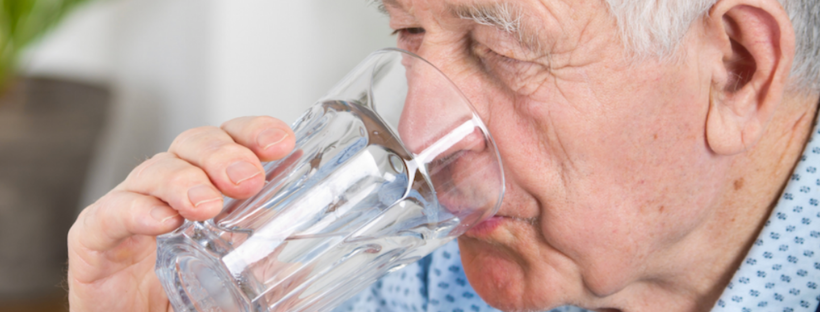Why Does Your Body Need Water?
Your body needs fluids to stay healthy and to keep all its systems working properly. Your heart, your brain, and your muscles all need water. Those fluids nourish your cells, stop you getting constipated, and flush bacteria out of your bladder.
Healthy people need about 1-1.5 litres of water per day – but not all at once. You can have too much of a good thing though. People with kidney, liver, heart or thyroid problems or people taking medicines that cause water retention (like some pain medications and antidepressants), should follow their doctor’s advice on how much water to drink.
If you’re using or losing more fluid than you take in, you’ll become dehydrated, meaning your body won’t have enough fluids to function properly.
Signs and Consequences of Dehydration in Elderly People
Symptoms of dehydration in the elderly include:
- Dry mouth and lips
- Dry skin
- Drowsiness
- Confusion or disorientation
- Poor concentration
- Slow reaction times
- Dizziness
- Dark and strong-smelling urine
- Cramps
- Headaches
- Irritability.
If dehydration becomes severe, an older person might experience symptoms such as faster breathing, a rapid pulse, muscle cramps and stomach bloating.
Dehydration can have serious consequences in older people. Dizziness increases the risk of a fall, which can cause physical and emotional trauma. Dehydration makes urinary tract infections or constipation more likely.
Why Is Dehydration a Problem in Older People?
Older people are at higher risk of dehydration because of the way age affects the body and because they may have other medical conditions or take medications that make dehydration more likely.
Age may affect hydration by:
- Reducing the feeling of thirst, meaning people don’t feel the need to drink – a common problem for people who’ve had a stroke or live with dementia
- Causing incontinence – older people may deliberately drink less to avoid having an accident
- Making people more likely to be taking fluid-draining medicine such as laxatives and diuretics
- Making the body’s fluid reserve smaller
- Reducing the ability to conserve water
- Making it harder to move around and get a drink.
Tips For Helping an Older Person Staying Hydrated
The aim is to drink regularly throughout the day so the body is always topping up with new fluids to replace those being lost. So, how do you encourage an elderly person to drink enough water?
You could try:
- Putting 5 glasses of water or juice in the fridge each day as a visual reminder of how much to drink
- Leaving drinks around the house so they’re easily on hand
- Setting alarms to remind them to drink, especially if they don’t tend to feel thirsty
- Varying the drinks by adding lemon or lime slices for a flavour change
- Providing a straw if that makes it easier to drink
- Encouraging them to eat water-rich foods like salads, fruit or applesauce
- Reminding them to drink something whenever they eat, take medicines or catch up with friends
- Encouraging them to drink more in hot weather
- Suggesting they drink more during the mornings and less in the evenings if it’s hard for them to get to the toilet in the night
- Ensuring they have easy access to a toilet – perhaps it’s time for a commode
- Asking any carers who come to the home to offer them a drink and monitor their fluid intake.
How Can Focused Health Care Help?
Focused Health Care is run by Registered Nurses, meaning we understand the importance of hydration. We also understand the many different ways older people can become dehydrated and are alert to its signs when caring for people in their homes.
Our in-home carers are trained to offer drinks when giving medicine or food, help with toileting and remind people to drink.
If you’d like help caring for an older person, then contact us to discuss our in-home care services.






